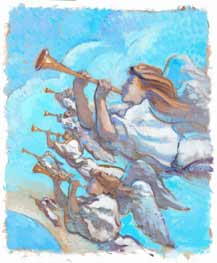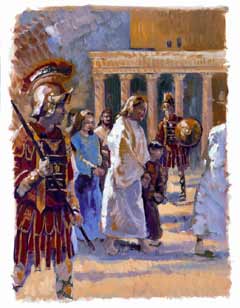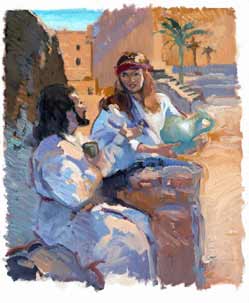|
FOCUS
ON REVELATION - LESSON 12
Jesus
Wins!
Revelation 8-10
They were taking
a walk together. The little boy darted here and there among the boulders
and tumbleweeds, but the older man walked steadily along the crest
of the hill. A bright afternoon sun illuminated the landscape for
father and son. Suddenly the boy decided he'd try to run as fast
as he could and took off down the gentle slope. He kept going faster
and faster. The father climbed up on a rock and froze. From his vantage
point he could see that the slope ended in a cliff. His boy, who
could now barely keep up with his flailing legs, couldn't see the
drop ahead.
Immediately the
father yelled as loudly as he could, "Jason, fall down! Fall down
now!" The message didn't make much sense to the boy. But he instantly
obeyed, compelled by some instinct inside him. He dropped to the
grass—and tumbled to a stop a few feet from the cliff.
 Sometimes
quiet suggestions aren't enough. Sometimes love has to shout. God much
prefers to talk to us, His children, in a quiet, gentle voice. While
on Earth, Jesus spent most of His time mending crippled limbs, making
leprous features whole, lifting up the oppressed, and encouraging outcasts.
But sometimes Jesus had to shout. When confronted by demons unwilling
to let go of their victims, He raised His voice to force them out. Sometimes
quiet suggestions aren't enough. Sometimes love has to shout. God much
prefers to talk to us, His children, in a quiet, gentle voice. While
on Earth, Jesus spent most of His time mending crippled limbs, making
leprous features whole, lifting up the oppressed, and encouraging outcasts.
But sometimes Jesus had to shout. When confronted by demons unwilling
to let go of their victims, He raised His voice to force them out.
In Revelation 8-11
seven angels blow seven trumpets. Here God is raising His voice in
warning about judgment and the need for a relationship with our heavenly
Father. Here God is calling for a repentance that changes our lifestyle.
In order to create
the proper setting for the blowing of the trumpets, God first takes
us back into the sanctuary.
Read
Revelation 8:2-6.
1.
What two things does John see being offered on the altar in heaven?
(Revelation 8:2, 3.)
Incense
and the sins of the saints.
Incense and the prayers of the saints.
Incense and the good deeds of the saints.
Incense is usually
fragrant and pleasing to the senses. It represents Jesus—His
sweet, kind, gentle spirit, His own perfect merits blending with
our prayer requests as He gladly responds. I'm glad Jesus lets us
know our prayers are important to Him!
2.
Next, John sees the golden censer being thrown down from heaven to earth.
What four
calamities take place when the censer strikes the earth? (Revelation
8:5.)
Tidal
waves, famines, diseases, and death.
War,
hurricanes, floods, and droughts.
Noises,
thunder, lightning, and an earthquake.
These calamities
represent the fact that rebuke, discipline, and punishment may follow
warnings. God is merciful, but He is also just. Remember, Jesus told
the church of Laodicea, "As many as I love, I rebuke and chasten.
Therefore be zealous and repent" (Revelation 3:19). As we shall see
in the next few verses, God sometimes removes His protection. In
an earlier lesson we learned about the vision of the seven churches
and how they portray the spiritual decline of God's people from the
beginning of Christianity till just before the second coming of Jesus. In
love and mercy, God calls people to repentance. However, there comes
a time when disasters strike the earth. God uses these to get people's
attention. The vision of the trumpets shows God's warning to the
people He loves.
In our interpretation
of the seven trumpets we'll focus on the historical view of Revelation,
which sees this series of trumpets as a vision covering similar
time periods in history as the visions of the seven churches and
seven seals. The same important political and religious events
are represented again, from a different point of view. Applying
the seven trumpets to history, we see the following sequence of
events.
A
Historical Summary of Events Under the Seven Trumpets
The trumpets
fall into three distinct groups: the first four present judgments
connected with objects in nature such as hail, stars, and the
sun. Numbers five and six present judgments connected with living
things such as locusts and horsemen. And the seventh presents
the great, final, all-encompassing judgment that affects all mankind.
 The
symbolic language used in these verses has perplexed Bible scholars.
Though we may not be able to understand every symbol perfectly, God
does want us to understand the reason for the trumpet judgments. The
trumpets come because of sin—God hopes that those He loves will
turn to him. Bible scholars have seen an application of the seven trumpets
in the history of Rome. Rome became a "Christian" empire, but as we
have seen in our past studies, persecution and following man's traditions
over Scripture was part of its lifestyle. Because historically, Rome
disregarded God's leading, He needed to get its attention. Thus came
the seven trumpets. The
symbolic language used in these verses has perplexed Bible scholars.
Though we may not be able to understand every symbol perfectly, God
does want us to understand the reason for the trumpet judgments. The
trumpets come because of sin—God hopes that those He loves will
turn to him. Bible scholars have seen an application of the seven trumpets
in the history of Rome. Rome became a "Christian" empire, but as we
have seen in our past studies, persecution and following man's traditions
over Scripture was part of its lifestyle. Because historically, Rome
disregarded God's leading, He needed to get its attention. Thus came
the seven trumpets.
The first judgments
fell upon the western portion of Rome. Barbarian tribes such as
the Goths attacked Rome by land. These attacks were followed by
the Vandals, a tribe whose ships controlled the Mediterranean.
During the fifth century the Huns pillaged and overran Rome, taking
taxes from the citizens and making their personal lives miserable.
Finally, in A.D. 476 the Heruli tribe dethroned the last emperor
and extinguished the imperial glory of the Western Empire.
Following the
first four trumpets, an angel blasts on the trumpet with the fifth
judgment. The Eastern Roman Empire followed in the footsteps of
the Western Empire in turning against God's law. Finally, judgment
came, not from barbaric tribes this time, but from out of the
desert of Arabia. The Ottoman Turks swept through the Eastern
Empire. The sixth trumpet marks the end of the Ottoman Empire.
The seventh trumpet heralds the coming of Jesus.
Now let's take
a more detailed look at the events associated with each trumpet.
First
Trumpet: Vegetation Stricken
Read Revelation
8:7 and then summarize the events that followed the blowing of
the first trumpet.
3.
When the first trumpet sounds, what two things fall on the earth mingled
with blood?
(Revelation 8:7.)
Lightning
and thunder.
Hail
and fire.
Pestilence
and wind storms.
4.
How much of the trees and grass on earth are destroyed? (Revelation 8:7.)
One-third
of the trees and all the grass.
All of the trees and one-third of the grass.
All of the trees and all of the grass.
Hail, fire,
and blood represent destruction in Bible prophecy. Trees and grass
symbolize people. Isaiah, for example, writes that God's people
will "spring up among the grass" and be "like willows" by the
water (Isaiah 44:3, 4). Historically, it represents the successful
invasion of the Roman Empire by a tribe called the Visigoths.
The hail, fire, and blood symbolize the destruction that came
as a result of the warfare.
Second
Trumpet: Seas Stricken
5.
What happens in the earth's seas when the second trumpet sounds? (Revelation
8:8, 9.)
The sun becomes twice as hot, so the seas are dried up; every living
thing in them dies.
The polar ice-cap melts due to the sun's heat, and the seas overflow
one-third of the land on earth.
One-third
of the sea becomes blood; one-third of the living creatures in the sea die;
and
one-third of the ships are destroyed.
In prophecy water
represents nations and people (Revelation 17:1, 15). Jeremiah and
Daniel refer to a nation also as a "mountain." Jeremiah the prophet
describes Babylon as a "destroying mountain" (Jeremiah 51:25). After
this second trumpet sounds, we see blood, ships destroyed, and sea
creatures dying. There's a great deal of death and destruction. And
it's initiated by a huge mountain being thrown into the sea. In other
words, a nation or empire falls on (attacks) a large group of people.
Applying the historic timeline, the event being symbolized here is
the fall of the Roman Empire in A.D. 476, some 400 years after Jerusalem's
destruction. Various tribes from Europe attacked Rome relentlessly
until she fell to her knees in submission.
Stop for a moment
and reflect on what you have just read.
Have
you ever faced a tragedy that seemed like a huge mountain? Are you
facing obstacles now that seem insurmountable? What mountain—either
in the past or in the present—would you like God to remove?
 God
wants to help you deal with the things that haunt you and the things
that trip you up. He cares about your personal life. That is why He
gives us this warning and tells us in the book of Revelation about future
events. Do you know how special you are to God? This prayer is for you: God
wants to help you deal with the things that haunt you and the things
that trip you up. He cares about your personal life. That is why He
gives us this warning and tells us in the book of Revelation about future
events. Do you know how special you are to God? This prayer is for you:
— Prayer —
Father, take
the problem that I've just spelled out and turn it into something
positive. Please prevent it from causing pain and difficulty
in my life. Please replace my worry, guilt, and doubt with Your
peace, hope, and comfort. Thank You in the name of Jesus. Amen.
Third
Trumpet: Waters Stricken
Read
Revelation 8:10, 11.
John sees a great
star blazing through the sky and splashing down in the rivers and
springs of Earth. The burning star is called "Wormwood." Wormwood
is a poisonous and very bitter plant. In these verses, it poisons
the water and kills one-third of the people who drink the water.
6.
What does "water" symbolize in Bible prophecy? (Revelation
17:1, 15.)
People, nations, multitudes, and tongues.
The plan of salvation and God's grace.
Physical
life and those things that are essential to sustain life.
7. What does a "star" represent in Bible prophecy? (Revelation
1:20.)
God's creative power.
The light of God's truth.
An angel.
So let's interpret.
There are two applications for us to consider. One is historical;
the other is spiritual. First, the historical: We have described
in these verses the invasion of the Roman Empire by Attila the Hun
in the fifth century. The people of Rome thought the Devil had fallen
upon them. The Huns raped, murdered, pillaged, and burned the cities
of Rome without mercy or compassion. Life was bitter and extremely
difficult.
Satan is treating
the world in the same way. From a spiritual perspective, we see the
following in these verses: An evil (bitter) angel (star) representing
Satan, fell to Earth among people (into the water) and polluted them.
Applying an historical progression of events, this symbolizes what
happened during the darkest part of the Middle Ages. Church leaders,
influenced by Satan, filled Christendom with spiritual error. The
worst kind of superstition prevailed. This corruption resulted in
great spiritual loss (many people died).
False teachers,
who pollute water, contrast sharply with Jesus, the living water
who gives life. Satan pollutes what is pure; Jesus purifies what
is polluted.
THE
LIVING WATER
 One
day Jesus met a lonely woman who'd come to Jacob's well to draw water.
Relationships just hadn't worked out for her. She'd lived with five
men and now she was trying number six. Jesus quickly recognized what
she needed—a relationship with Him that could bring healing and
stability into her life. Jesus told her, "Whoever drinks of the water
that I shall give him will never thirst. But the water that I shall
give him will become in him a fountain of water springing up into everlasting
life" (John 4:14). Jesus was referring to the Holy Spirit dwelling inside
us and reproducing in us the fullness of God. One
day Jesus met a lonely woman who'd come to Jacob's well to draw water.
Relationships just hadn't worked out for her. She'd lived with five
men and now she was trying number six. Jesus quickly recognized what
she needed—a relationship with Him that could bring healing and
stability into her life. Jesus told her, "Whoever drinks of the water
that I shall give him will never thirst. But the water that I shall
give him will become in him a fountain of water springing up into everlasting
life" (John 4:14). Jesus was referring to the Holy Spirit dwelling inside
us and reproducing in us the fullness of God.
As you look at
your life, perhaps you see too many dead-end relationships. Perhaps
you struggle with days and nights of pain and loneliness. Jesus says
to you right now, "Ask Me to give you the Holy Spirit in your life—just
like you ask someone for a glass of water—and I will do it." If
your desire is to receive the Holy Spirit promised by Jesus, repeat
the following prayer:
"Jesus, I
want so much never to thirst again. Yes,
I want the Holy Spirit to continually live within me, giving
me peace, hope, joy, fulfillment, and trust in You."
Fourth
Trumpet: Heavens Stricken
Read
Revelation 8:12, 13.
8.
What happens when the fourth trumpet sounds? (Revelation 8:12, 13.)
One-third of the light from the sun and moon is darkened, and one-third
of the stars do not shine.
The light of the sun and moon becomes three times brighter, and one-half
of the stars are darkened.
The
sun and the moon are destroyed, and one-third of the stars no longer shine.
Historical, we
find the darkening of these heavenly luminaries represents two applications:
the collapse of the Roman Empire and the loss of spiritual truth.
Under this trumpet, the emperors, senators, and consuls of Rome (the
sun, moon, and stars) ceased to exist when the Roman Empire collapsed
in A.D. 476.
From a spiritual
and historical perspective, the fourth trumpet is the continuing
result of events under the third trumpet when false teachings diluted
biblical principles. Jesus is the "light of the world" (John 8:12)
and the "sun of righteousness" (Malachi 4:2). But now vital truths
about His sacrificial life and death are obscured.
The Christian church
of the Roman Empire introduced its own system of salvation. Indulgences,
which could be purchased, replaced the "free gift" of eternal life
offered to all who place their faith in Jesus. The church's bloody
efforts to compel orthodoxy replaced God's gracious appeals to the
conscience of human beings.
Verse 13 mentions
three "woes" about to befall the inhabitants of Earth. What John
is saying is that events under the first four trumpets were bad,
but the next three will be worse.
The calamities
that each of the seven trumpets introduces can make people fearful.
They are tragedies. So it is important to remember that, in the middle
of terror and difficulty caused by Satan, we can listen to God's
promises designed for just such occasions. He says to you and me: "The
angel of the Lord encamps all around those who fear Him, and delivers
them" (Psalm 34:7). God's promise is that, no matter what your circumstance,
if you are His friend, you are surrounded by angels whom He personally
sends to be close by you. How can you say "No" to a God who loves
you like that?
Fifth
Trumpet: Locusts from the Bottomless Pit
Read
Revelation 9:1-12.
This passage can
seem difficult to understand. But the historical sequence we are
following will help. The next big historical event was the invasion
of the Eastern Roman Empire (the Byzantine Empire) by the Arabs.
We can see how various symbols highlight key elements in this conquest.
Applying the historic events of the invasion to the words of these
verses would look like this:
 Out
of the desert, the Arabs swept through eastern Rome. The warriors were
expert horsemen. With long hair flowing from under their turbans, they
would ride straight toward the enemy, then pretend to turn around and
retreat. When the enemy was close behind, the warriors would unleash
a hail of arrows over the tails of their horses. The skill and swiftness
of these armies caused them to be compared to locusts that scourge the
land or to scorpions that sting, poison, and kill. Out
of the desert, the Arabs swept through eastern Rome. The warriors were
expert horsemen. With long hair flowing from under their turbans, they
would ride straight toward the enemy, then pretend to turn around and
retreat. When the enemy was close behind, the warriors would unleash
a hail of arrows over the tails of their horses. The skill and swiftness
of these armies caused them to be compared to locusts that scourge the
land or to scorpions that sting, poison, and kill.
Using the day-for-a-year
principle established in symbolic biblical prophecy, the five months
of torment would represent a 150-year time period (5 months x 30
days = 150 days, or years). The beginning date assigned to this period
is July 27, 1299, when the Ottoman Turks attacked at the battle of
Bapheum, near Nicomedia. The ending date is July 27, 1449.
Verse 6 indicates
that because of the suffering of war, many would prefer death, but
would have to go on suffering for a time.
Can you think of
ways in which Jesus helped you make it through times of intense pain
and crisis?
Sixth
Trumpet: The Angels from the Euphrates
Read
Revelation 9:13-21.
This trumpet sets
off events that are a continuation of the invasion by the Ottoman
Turks into the Roman Empire.
The historical application of the symbols is as follows:
The symbols apply
to the continual warfare of the Ottoman Turks against Rome. The numbers
of invaders, the fire, the smoke and sulfur, the destruction of a
third of mankind—all these are references to fighting and destruction.
The time period of one hour, one day, one month, and one year has
been interpreted, following an historical perspective, to refer to
the 391 years following the date given under the fifth trumpet. This
brings us to August 11, 1840, the end of the Ottoman Empire.
9.
What sins do those continue to commit who are not killed by the
plagues that happen
when the sixth trumpet sounds? (Revelation
9:20, 21.)
They
blaspheme God and His commandments; they delight in persecuting God's
people.
They
worship demons and idols; they commit murder, sorcery, sexual immorality,
and theft.
They
lie, steal, and commit adultery.
Even
the judgments they endured under the trumpets did not produce widespread
repentance or reformation among Christians of the time.
Is there a particular
sin or group of sins that has a grip on your life? You want to break
the habit, but every time you think you have the victory, you sin
again. Jesus promises victory for you. That is why He left heaven
and came to this earth—because He cares about you. There is
victory in Jesus! Just ask Him. He is willing to help you.
Seventh
Trumpet: The Kingdom Proclaimed
After the blowing
of the sixth trumpet there is a pause in the sequence. We don't come
to the seventh trumpet until Revelation 11:15. That's because John
needs to describe some important events in chapters 10 and 11 that
lead up to the blowing of the seventh trumpet. These are events that
precede the second coming of Christ. We will study the events in
another lesson.
 Read
Revelation 11:15-19. Read
Revelation 11:15-19.
Exciting! The
trumpet blasts and loud heavenly voices proclaim the good news, "The
kingdoms of this world have become the kingdoms of our Lord and of
His Christ, and He shall reign forever and ever!" (vs. 15).
Earth's history
comes to its climax! God terminates the rule of nations that have
persecuted and oppressed His people. He sets up a nation of peace
and justice. Death and suffering, grief and cruelty, will be gone
forever. No one will ever distort the picture of God's love and grace
again.
When you think
about Jesus returning to Earth to let you live with Him forever,
how does it make you feel?
A
Basic Lesson from the Seven Trumpets
God is not pleased
when religious or political leaders grossly misrepresent Him either
by what they teach or how they mistreat people. After patiently working
to persuade these individuals to see the light and change their ways,
God has to remove His protection at some point and let them reap
what they sow. These trumpet blasts remind us in no uncertain terms
that God wants His people to be kind, considerate, understanding,
and generous. That's the kind of person he longs to "seal" under
His protection in the worst of times.
§ § §
Enemy nationals
herded into Shantung Compound by Japanese forces in 1943 endured
months of boredom, frustration, overcrowding, and fear. People got
on each other's nerves. The camp split into hostile groups. But one
man there, Eric Liddell, a missionary from Scotland, managed to stay
friendly with everyone.
The most profane
businessmen among the internees came to respect and love this man.
He stood tall during those long months of internment. He lived his
life as an expression of unchanging principles, principles he meditated
on every morning at six when he tiptoed quietly past sleeping companions
and lit a small lamp to illuminate his Bible and notebook.
Wouldn't you like
to stand with Jesus when the trumpets start blowing? Wouldn't you
like to shine for Him when the sky begins to darken? You can do it,
because He will place His Spirit inside you, welling up to eternal
life. You can be faithful, because He is faithful. The choice is
yours. Say "Yes" to the One who longs to place His "seal" in your
heart.
— Prayer —
Father, I
say "Yes" to Your invitation to live a life with You that brings
hope, peace, and security. Thank You for the forgiveness of sins
and for the victory that is mine in Jesus. I ask this in the
name of Jesus. Amen.
|